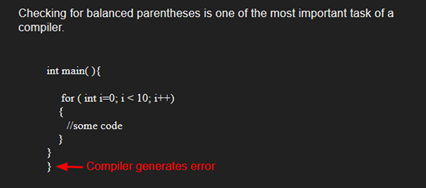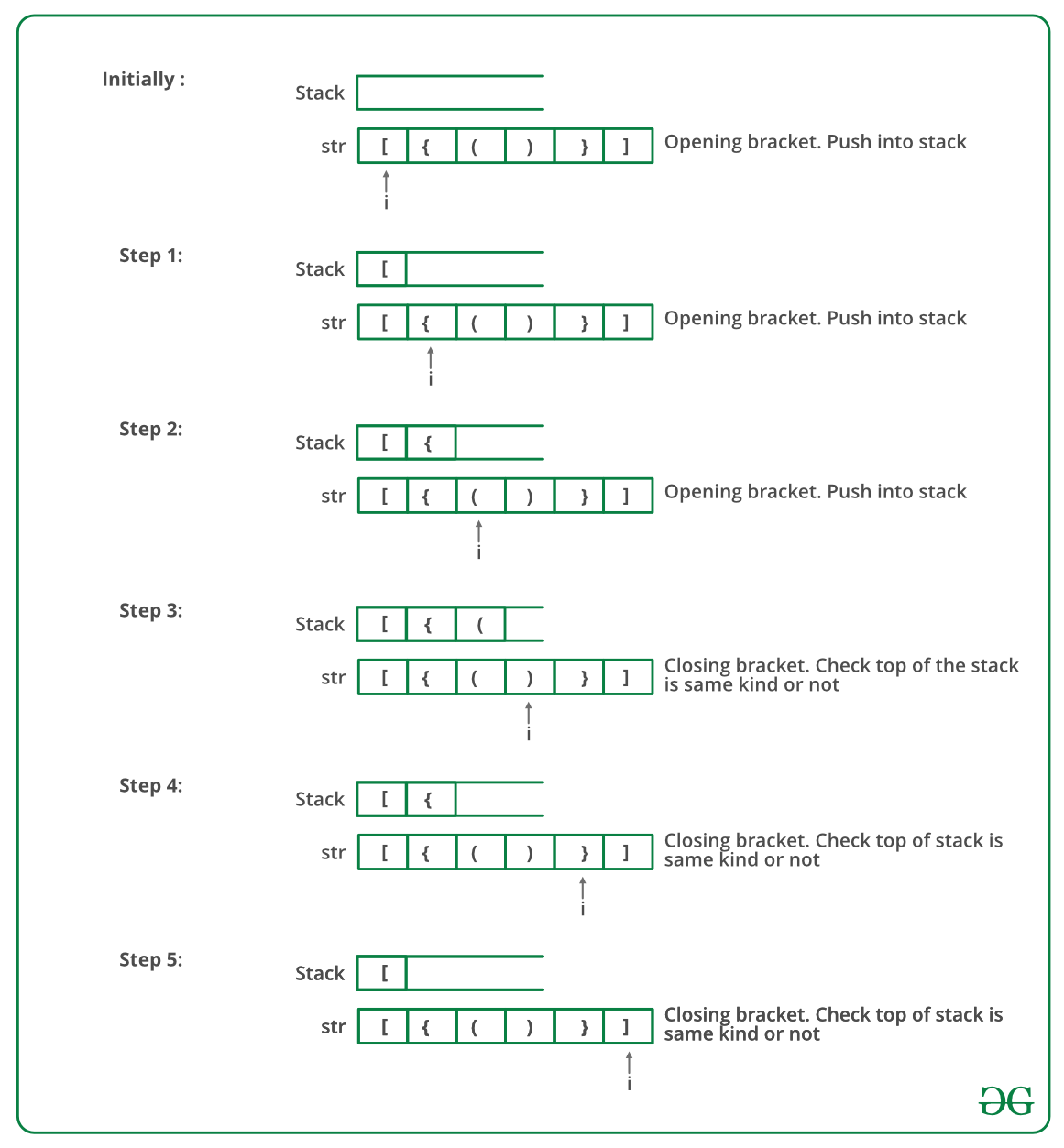Dada una string de expresión exp, escriba un programa para examinar si los pares y los órdenes de “{“, “}”, “(“, “)”, “[“, “]” son correctos en exp.
Ejemplo :
Entrada : exp = “[()]{}{[()()]()}”
Salida : BalanceadaEntrada : exp = “[(])”
Salida : No balanceada

Algoritmo:
- Declara una pila de caracteres S.
- Ahora recorra la string de expresión exp.
- Si el carácter actual es un corchete de inicio ( ‘(‘ o ‘{‘ o ‘[‘ ) entonces empújelo para apilar.
- Si el carácter actual es un corchete de cierre ( ‘)’ o ‘}’ o ‘]’ ), entonces salte de la pila y si el carácter reventado es el corchete de inicio correspondiente, entonces bien, de lo contrario, los corchetes no están equilibrados.
- Después de completar el recorrido, si queda algún soporte inicial en la pila, entonces «no está equilibrado»
La imagen de abajo es una ejecución en seco del enfoque anterior:

A continuación se muestra la implementación del enfoque anterior:
C
#include <stdio.h>
#include <stdlib.h>
#define bool int
// structure of a stack node
struct sNode {
char data;
struct sNode* next;
};
// Function to push an item to stack
void push(struct sNode** top_ref, int new_data);
// Function to pop an item from stack
int pop(struct sNode** top_ref);
// Returns 1 if character1 and character2 are matching left
// and right Brackets
bool isMatchingPair(char character1, char character2)
{
if (character1 == '(' && character2 == ')')
return 1;
else if (character1 == '{' && character2 == '}')
return 1;
else if (character1 == '[' && character2 == ']')
return 1;
else
return 0;
}
// Return 1 if expression has balanced Brackets
bool areBracketsBalanced(char exp[])
{
int i = 0;
// Declare an empty character stack
struct sNode* stack = NULL;
// Traverse the given expression to check matching
// brackets
while (exp[i])
{
// If the exp[i] is a starting bracket then push
// it
if (exp[i] == '{' || exp[i] == '(' || exp[i] == '[')
push(&stack, exp[i]);
// If exp[i] is an ending bracket then pop from
// stack and check if the popped bracket is a
// matching pair*/
if (exp[i] == '}' || exp[i] == ')'
|| exp[i] == ']') {
// If we see an ending bracket without a pair
// then return false
if (stack == NULL)
return 0;
// Pop the top element from stack, if it is not
// a pair bracket of character then there is a
// mismatch.
// his happens for expressions like {(})
else if (!isMatchingPair(pop(&stack), exp[i]))
return 0;
}
i++;
}
// If there is something left in expression then there
// is a starting bracket without a closing
// bracket
if (stack == NULL)
return 1; // balanced
else
return 0; // not balanced
}
// Driver code
int main()
{
char exp[100] = "{()}[]";
// Function call
if (areBracketsBalanced(exp))
printf("Balanced
");
else
printf("Not Balanced
");
return 0;
}
// Function to push an item to stack
void push(struct sNode** top_ref, int new_data)
{
// allocate node
struct sNode* new_node
= (struct sNode*)malloc(sizeof(struct sNode));
if (new_node == NULL) {
printf("Stack overflow n");
getchar();
exit(0);
}
// put in the data
new_node->data = new_data;
// link the old list off the new node
new_node->next = (*top_ref);
// move the head to point to the new node
(*top_ref) = new_node;
}
// Function to pop an item from stack
int pop(struct sNode** top_ref)
{
char res;
struct sNode* top;
// If stack is empty then error
if (*top_ref == NULL) {
printf("Stack overflow n");
getchar();
exit(0);
}
else {
top = *top_ref;
res = top->data;
*top_ref = top->next;
free(top);
return res;
}
}
Balanced
Complejidad de Tiempo: O(n)
Espacio Auxiliar: O(n) para pila.
¡Consulte el artículo completo sobre Verificación de paréntesis equilibrados en una expresión (bien formado) usando Stack para obtener más detalles!
Publicación traducida automáticamente
Artículo escrito por GeeksforGeeks-1 y traducido por Barcelona Geeks. The original can be accessed here. Licence: CCBY-SA